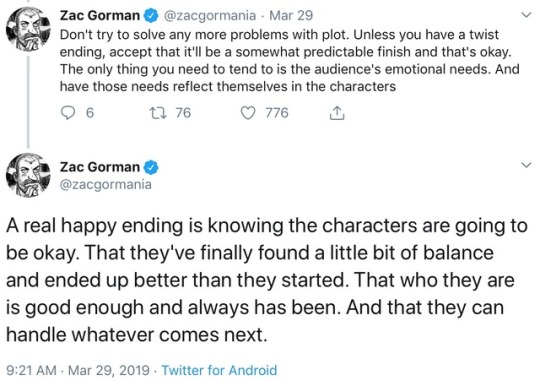Spite & stardust. 34 years old, lvl 80 Social Justice Shadow Priest. HR Professional, Luciferian Witch, writer, artist. Anguissette. Not really a people person. Works in HR anyway. Mentally ill + chronic pain spoonie. Fat, white, AFAB, queer. They/them, please. If you appreciate my HR and job search advice and have a couple bucks to spare, why not buy me a coffee? http://ko-fi.com/jadelyn
Don't wanna be here? Send us removal request.
Text




#Ah yes#I both missed and very much did not miss the deranged feral energy of this hellsite#If I had to see this with my own two eyes then so do the rest of you
28K notes
·
View notes
Photo

If you see this on your dashboard, reblog this, NO MATTER WHAT and all your dreams and wishes will come true.
#I can't believe this post is still around#Feels a bit like being welcomed home as today I opened the Tumblr app for the first time in literally 2 to 3 years#Only to come across this Artifact. This world heritage post. A fellow time traveler from the first age.#Hang on holy shit you can reorder tags now? Without deleting and readding them to get them in sequence??#Amazing perfect 11/10
232K notes
·
View notes
Text
Yes. For those who don’t know: if you’re in the U.S., you have a legal right to engage in concerted activity to improve your working conditions, which explicitly includes discussing your pay with other employees. These rights apply to you whether you’re in a union or not - you do not have to be unionized to be protected from retaliation for engaging in concerted activity. Do note that the NLRA specifically excludes some industries and employees - supervisors, government employees, transit employees, and independent contractors are not covered. For the rest of us, here’s some more info on concerted activity from the NLRB’s website:
Concerted activity - Federal law protects employees engaged in union activity, but that's only part of the story. Even if you're not represented by a union - even if you have zero interest in having a union - the National Labor Relations Act protects your right to band together with coworkers to improve your lives at work. You have the right to act with coworkers to address work-related issues in many ways. Examples include: talking with one or more co-workers about your wages and benefits or other working conditions, circulating a petition asking for better hours, participating in a concerted refusal to work in unsafe conditions, and joining with coworkers to talk directly to your employer, to a government agency, or to the media about problems in your workplace. Your employer cannot discharge, discipline, or threaten you for, or coercively question you about, this "protected concerted" activity. However, you can lose protection by saying things about your employer that are egregiously offensive or knowingly and maliciously false, or by publicly disparaging your employer's products or services without relating your complaints to any labor controversy.
If your employer pulls this shit, or your manager verbally tries to discourage you from talking about your pay or other material working conditions (benefits, hours/scheduling, safety, etc), write down the details (time/date/who was present/what exactly was said) and file a charge with the NLRB via your local field office. If employers aren’t held accountable for their bullshit, they’ll keep on doing it.
Find your local field office here.

#labor law#i'm not really back on tumblr per se but brynn linked me to this post and i wanted to add this info for ppl who might not know the details
53K notes
·
View notes
Text
How to respond when someone tries to drag you into shipping or kink discourse when you don't want to
Copy and paste the following:
I understand. You found paradise in America, you had a good trade, you made a good living. The police protected you and there were courts of law. You didn’t need a friend like me. But, now you come to me, and you say: “Don Corleone, do you support this ship/kink?” But you don’t ask with respect. You don’t offer friendship. You don’t even think to call me Godfather. Instead, you come into my house on the day my daughter is to be married, and you ask me to get involved in your discourse.
61K notes
·
View notes
Text
i’m so bad at remembering the average age for baby milestones like someone will be like “she’s 18 months (:” and i’ll be like “right what can she…… do? teeth? are there teeth?”
#I have to keep looking up developmental milestones when my mom or SIL talks about my niece#Like...cool? Is that good? Normal? Ahead of schedule? Who tf know
220K notes
·
View notes
Text
Can the person who has me trapped in their tamagotchi make me do some basic tasks today please.
30K notes
·
View notes
Text
angst with no happy ending ???? in this economy ????
46K notes
·
View notes
Text
If it was an email, "let me forward that to you to bring it back to the top of your inbox." If it was a task, "already took care of it, no need to worry!"
Office emails, decoded
I was musing on the everyday passive-aggression of business emails at work the other day after a particularly pissy back-and-forth with my least favorite coworker, in which we basically told each other to fuck off in plain view of both our bosses (who were cc’d on the whole thing), but because we did it in professional language we can get away with that. So, I decided to make a list of the most common code-words and phrases and what they really mean, for anyone entering their first white-collar business environment who might want help translating or need to know how to deliver a polite, professional “fuck you”.
“I’d just like to get some clarity on this/can you clarify for me” = what the fuck are you talking about/what the fuck did you do?
“Let’s discuss next steps” = get off your ass and make it happen you lazy shitwad.
“Thanks for following up with me about this” = I’m busy and I’ll get to you when I have a moment. Quit fucking riding my ass.
“If you need it sooner than that” = I have my own work to do; do it your damn self if it’s that urgent.
“What’s our timeline on this?” = I have no intention of doing that for you right now. How long can I put it off?
“It’s going to be challenging, but…” = do you have any fucking idea what you’re asking me to do?
“I see where you’re coming from” = you are so fucking wrong
“Would you like to take the lead on this?” = this is not my problem and I refuse to clean up your mess.
“Maybe we could schedule some time to discuss this over the phone” = stop avoiding me and answer the fucking question, asshole
“[Someone on the CC line of the email], please feel free to weigh in!” = I don’t have the authority to tell this shithead how wrong they are. Kindly step up and do it for me.
“It was my understanding that” = we’ve already had this conversation, please shut the fuck up
“Please reach out to [person]” = I’m tired of hearing you whine about this, go pester someone else for awhile.
8K notes
·
View notes
Photo






[thread]
I think it’s worth looking at why bad endings ruin stories. This will be a big rambling thread I’m gonna chip away at so feel free to mute if it’s not your cup of tea #storytalk
I was inspired to write this after @MagnoliaPearl posted something about the ending of Parks & Rec. Which was abysmal. To the point where when I rewatched the series, I stopped before the last season. It’s an ending that felt like a betrayal even though it was a “happy” one
You can’t just toss in good things happening to characters that they haven’t earned. Everyone can’t win the lottery in the last episode. That’s not a happy ending, it’s Deus ex machina that betrays all the things the characters actually struggled for
If you were to draw a story curve, in general a happy ending is one where the characters end up better than where they started but really not too much better. It really depends heavily on how wildly the rest of your graph swings during the rest of your book
Here’s an entertaining clip of Kurt Vonnegut explaining a little tongue in cheek bit about graphing stories that’s actually pretty helpful for explaining what I’m getting at
youtube
If you look at P&R that way, it’d probably look a little something like this. It’s easy enough to see where reality breaks
It’s a bit of an exaggeration but not much. The point is, you probably shouldn’t swing too far up from whatever was your highest point during the story. If your previous high was “couple gets married,” then “couple has baby” is a realistic ending. “Couple win lottery” maybe not
Actually, never have anyone win the lottery after the first act. Unless it’s an inciting incident that forms the foundation of the entire story…no lottery. That’s a good rule
But the thing that really got me thinking was why does it matter? The show is over, right? It’s not like I’m then forced to then watch a show about Leslie Knope being President. I think it matters for a few reasons and bear with me here cuz I’m making this up as I go…
One is what I’ll call the Evergreen Ending principle. Which is that even though the story has ended, you need to be able to imagine the characters are continuing to have similar adventures forever. That’s part of what makes an ending feel good, especially for serialized media
Obviously, things will be different because the Real Story already happened. But it needs to be easy to imagine how these characters go on doing essentially the same stuff forever. The only thing worse than the ending P&R gave us would be one where Leslie retires, for example
This is also why I hate epilogues. Like the ending of Harry Potter where they all old and have kids. Let the audience imagine what happens next. That part isn’t for the creator to say. Back off and let your audience take over
If you change too much, even for the better, you’ve also ruined any possibility of the Evergreen Ending. You’ve essentially created a whole new series where everything is different, which only works if you’re then planning to tell that new story
Bad endings can never be fixed. Every other story problem can potentially be resolved. Which I think is why those moments tend to pull back the curtain on a writer’s failings. It’s why writing endings is so stressful
But here’s what I think works. And this is obviously just my opinion and who the hell am I? But I think that when you reach the real end of your story, your plot should be on autopilot. If you’ve done your job, the story will just fly home itself
Don’t try to solve any more problems with plot. Unless you have a twist ending, accept that it’ll be a somewhat predictable finish and that’s okay. The only thing you need to tend to is the audience’s emotional needs. And have those needs reflect themselves in the characters
A real happy ending is knowing the characters are going to be okay. That they’ve finally found a little bit of balance and ended up better than they started. That who they are is good enough and always has been. And that they can handle whatever comes next.
12K notes
·
View notes
Photo









Andrey Surnov | facebook | instagram | behance | deviantart evening traffic 1 subway shipyard crane cranes evening traffic 2 evening traffic 3 night shop 1 6:00 AM shooting gallery dark street pizzeria night shop 2 red café
Bonus:

closed café
more art by Andrey Surnov
113K notes
·
View notes
Photo










Ye olde Windows screen savers.
388K notes
·
View notes
Text
what does it say about us as a culture that most of our microwaves have a dedicated popcorn button
144K notes
·
View notes



